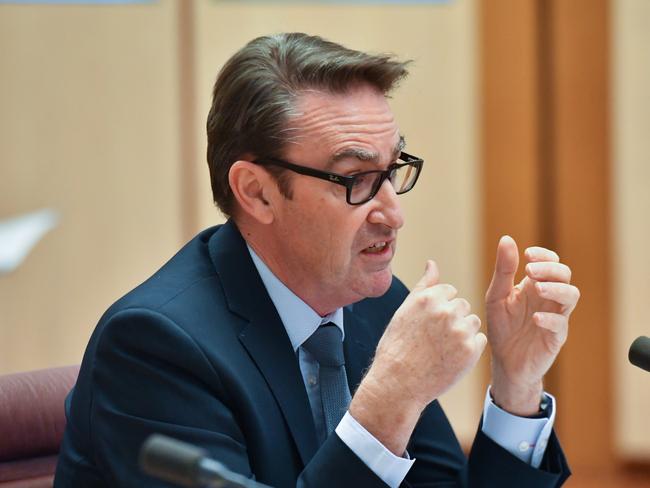Strong calls to extend Jobkeeper as Senate looks into new system
Unfair dismissal claims have soared to record levels as Australians lose jobs en masse because of the coronavirus crisis, as Treasury believes Australia could be in the midst of its unemployment peak.
Coronavirus
Don't miss out on the headlines from Coronavirus. Followed categories will be added to My News.
Treasury boss Steven Kennedy believes Australia could be in the midst of its unemployment peak stemming from coronavirus restrictions.
While the official unemployment rate is 6.2 per cent, Treasury is confident its forecast of 10 per cent is closer to the mark.
That’s because 489,000 people weren’t counted in the jobless rate due to leaving the workforce when statistics were recorded.
Dr Kennedy said when those people are factored in the true number out of work was about 9.6 per cent.
He said the headline unemployment figure would rise as people became available to work again because of eased restrictions.
“The peak in my view would come through in these months in April and May. We’d be pretty close to it (now) would be my guess,” he told a Senate committee on Thursday.
“In a measured sense, the unemployment rate may well rise between May and June because of the switch between out of the workforce and back into the workforce.” A further 720,000 remained in employment but didn’t work, indicating they were on the JobKeeper wage subsidy.

Dr Kennedy said it was hard to predict if a depression was looming, given that would mean a long period of economic downturn.
“We’ve gone well past the word recession,” he said.
Dr Kennedy said the return of consumer and business confidence was the hardest part of forecasting how economic recovery may look.
“The glimmer of hope is that all that productive enterprise that sat there at the beginning sits there at the end,” he said.
“The question is whether you’ve avoided the destructive cycles of firms going broke because they just ran out of cash.” He said consumption was likely to return because people have been restricted from buying.
“We’ll be more confident about recovery when we see business investment and housing investment, because at that point we’ll know people are more confident about the future,” Dr Kennedy said.
It comes as unfair dismissal claims have soared to record levels as Australians lose jobs en masse because of the coronavirus crisis.
Fair Work Commission general manager Bernadette O’Neill told the Senate committee on Thursday claims were up 70 per cent.
“The increase in unfair dismissal has been unprecedented, so significantly higher than any other period from our records,” she said.
She said unfair dismissal claims had been constant over a number of years, meaning the spike could be attributed to unemployment stemming from coronavirus restrictions.
Government industrial relations official Martin Hehir said the crisis had sparked high rates of job losses.
“It’s not surprising that we’re seeing escalation in things such as unfair dismissal,” he said.
Chair Katy Gallagher said her Labor colleagues would focus on asking him about the real state of the Australian labour market beyond the headline figures.
“More than a million Australians still remain locked out from JobKeeper and are no wiser as to why,” Senator Gallagher told AAP.
PUSH TO HAVE JOBKEEPER STAY
Everyday Australians have given the federal government’s Jobkeeper subsidy a big tick of approval, with many saying they would support it being extended after its current expiry date.
Exactly half of the respondents to an online survey conducted by personal finance app Humaniti over the weekend said they would support an extension of the scheme beyond September 28.
Of the 978 people who participated in the survey, 50 per cent were in favour, 28 per cent were opposed and 31 per cent were unsure.
There was similar support for government-mandated deferrals of commercial rents to be extended beyond September.
Forty-nine per cent of respondents were in support of deferrals being extended, while 21 per cent were opposed and 31 per cent were unsure.
National Retailers Association CEO Dominique Lamb told News Corp a taper period for the Jobkeeper subsidy would be welcome news for many struggling businesses.
“Retailers right now don’t need another hit. If you give them something like Jobkeeper and then take it away immediately, it would be problematic. But a gradual reduction would certainly give them time to manage their cash flow,” she said.

The federal government’s rental freeze was still not activated in WA, Queensland and the NT, and had only just become operational in SA and the ACT, causing issues for many businesses, Ms Lamb said.
“What that means is that there are retailers who haven’t seen the benefit of that mandated code so far. Basically people are waiting for these regulations so they can make a choice as to what they’re doing. It’s definitely causing delays for many retailers who are tenants,” she said.
The NRA has estimated that between 50 and 60 per cent of member businesses are currently trading.
Just as concerning, Ms Lamb said, was recent ABS data that showed discretionary spending was down 26 per cent.
“That figure is just extraordinary; so to think that (retailers) are going to come back in under a month is just really unlikely,” she said.
Danielle Wood, the incoming CEO of public policy think tank the Grattan Institute, said there were strong arguments in favour of extending Jobkeeper.

“I’m extremely worried about the situation where a whole lot of government support in the economy is going to cut out at once,” she told News Corp.
“You’ll go from a world where the government’s putting about $120 billion into the economy in the September quarter, 25 per cent of GDP, to a world where that drops to zero. That’s going to be an incredibly dangerous time for the economy,” she said.
“It won’t be business as usual by September, so taking a path that allows you to transition off the Jobkeeper payment makes a lot of sense.”
Ms Wood suggested a three-month extension of the Jobkeeper scheme after September was appropriate, but specified that all businesses should be reassessed for their eligibility.
She downplayed concerns that schemes such as Jobkeeper could entrench a welfare mindset in Australian business.
“This is an extraordinary economic circumstance. It’s big in terms of its scale, and it’s unprecedented in terms of the speed with which it has hit. This is a once-in-a-century event. I wouldn’t read too much into it in terms of long term support for business,” she said.
The Humaniti survey also showed mixed levels of support for local small businesses during the lockdown period.
Asked if they had spent more money with local businesses to support them over the past couple of months, almost a quarter of respondents (23 per cent) said they had.
Twenty-nine per cent of respondents had actually spent less, 43 per cent had spent about the same amount and 5 per cent were unsure.
Originally published as Strong calls to extend Jobkeeper as Senate looks into new system
